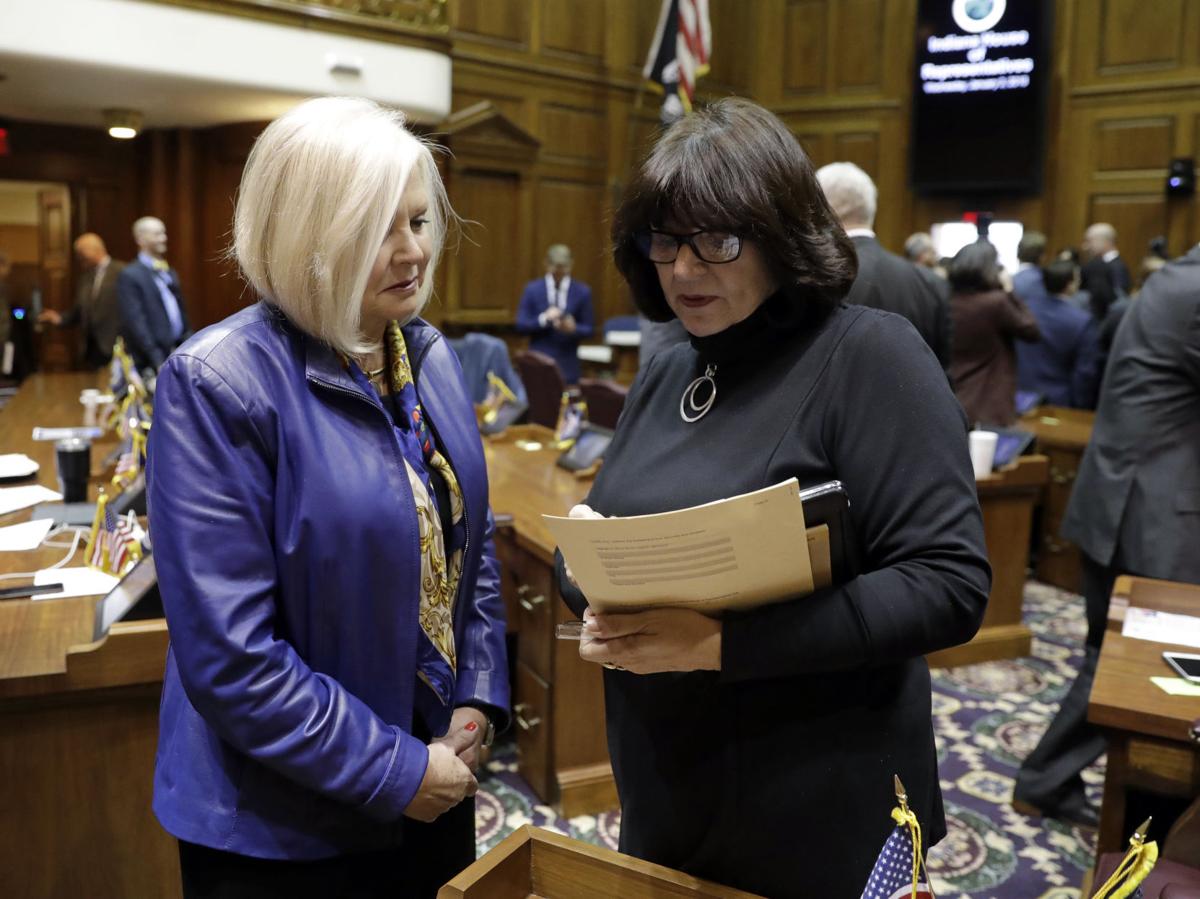INDIANAPOLIS — State Rep. Linda Lawson, D-Hammond, was dressed all in black Wednesday for what turned out to be her last first-day-of-session in the House chamber that she's patrolled for the past 20 years.
Shortly before the speaker gaveled lawmakers to order, the 69-year-old state representative told The Times she will not seek re-election to an 11th term in November.
"It's just, it's time to move on," Lawson said, choking back tears in her tiny office near the chamber floor.
"I'm tired. I've been in public service 41 years," she added. "And I want 10 acres in Brown County with a big fence and lots of woods, and no mail and no phone and no email address."
Lawson said she's still grateful to represent Hammond and Whiting residents in House District 1, many of whom she also served during her 24 years as a Hammond police officer, where she was the first female officer and ultimately retired as a captain, as well as in her 12 years on the Hammond School Board.
But Lawson explained she no longer gets the same thrill from being in the Statehouse or seeing her name on the House vote board as she did when she started in 1998 — in part because the bipartisanship and camaraderie that she said once prevailed are gone.
"I feel like a stranger in this building, and it's not that I don't belong, it's that I don't fit here, anymore," Lawson said.
"(House Speaker) Brian Bosma's yammering about this collective lovefest, we all get along so well, we all work together — that's just not true, it's just not true; it doesn't happen."
She said her happiest time in the Legislature was the six years she served as chairwoman of the House Judiciary Committee, where she was able to put her stamp on dozens of criminal law and courts matters moving through the General Assembly.
But it wasn't the power that made her happy, Lawson said. It was how well she was able to work with the Republican leaders of the Senate Judiciary Committee and the truly bipartisan measures they put together.
"It was such a collective good product, and we came out with some really good stuff," Lawson said. "And that's gone, there is none of that, anymore."
She said things especially changed after the 2012 elections when Republicans won a supermajority that they've maintained ever since. It is so large that even if every Democrat refused to show up there still would be enough GOP representatives present to legally conduct business.
"The climate in the Statehouse is just toxic," said Lawson, who noted that her firsthand law enforcement experience routinely is ignored by lawmakers aggressively pushing for lax gun laws that she says will endanger the lives of Indiana police and women.
Nevertheless, Lawson insisted she's not giving up. She plans to fight over the next 10 weeks for legislation guaranteeing equal pay for Hoosier women in the workplace.
"It's not only important for women, it's important for families because there's so many single women out there raising children by themselves," Lawson said.
"If pay was equitable they would be able to afford the kinds of things that they need for their families. When you start talking about people who are working a full-time job but still are eligible for aid through welfare, they're not making a decent wage."
As for her all-black apparel, Lawson said it merely signified a moment of mourning before an exciting new beginning.
"I've had a lot of transitions in my life," she said. "This is just a new chapter. It's not anything bad whatsoever."
Lawson is the third-longest-serving Northwest Indiana lawmaker to announce in recent weeks that they will finish their current terms but not seek re-election.
Together Lawson, state Rep. Charlie Brown, D-Gary, and state Rep. Scott Pelath, D-Michigan City, represent 76 years of combined Statehouse service for the Region.
ICYMI: Nine hot issues Indiana lawmakers are likely to tackle starting Wednesday

INDIANAPOLIS — Indiana lawmakers begin their 10-week "short session" at the Statehouse Wednesday, where debates over numerous hot issues could help Hoosiers forget the otherwise bone-chilling cold gripping the state.
If history is any guide, the 100 state representatives and 50 state senators are likely to file about 800 or so legislative proposals, most of which will be eliminated from consideration by the first week in February — the deadline for measures to pass their originating chamber.
"This session is fast. ... In the first half, some committees may have four hearings. Most committees will have three. Some may have two," House Speaker Brian Bosma, R-Indianapolis said. "There will just be a lot of bills that have to wait for another year."
That's because lawmakers generally are reluctant to spend new money in the middle of the state's two-year budget cycle, especially this year since state revenues between July and November 2017 came in 2.5 percent lower than expected compared to the spending plan enacted in April.
As a result, the General Assembly tends to focus in even-numbered years on more philosophical questions about individual rights, business interests and how Hoosiers should live.
There will be no shortage of proposals along those lines. Here's a look at some of the issues likely to dominate the 2018 legislative session:
Dan Carden, dan.carden@nwi.com, 317-637-9078Alcohol

After decades of forcing Hoosiers to travel across state lines on Sundays to purchase alcohol for at-home consumption, lawmakers appear ready to lift Indiana's Prohibition-era ban on Sunday retail alcohol sales in accordance with the November recommendation of the state's Alcohol Code Revision Commission.
However, there generally is less consensus on other major alcohol issues, such as tax rates and ending the cold-beer monopoly enjoyed by liquor stores. Should those matters get rolled into Sunday sales legislation through a committee or chamber amendment, support for Sunday sales could collapse, leaving Hoosiers with the status quo for yet another year.
"It's my hope that we have a single bill that deals with Sunday sales, there's a second bill that deals with the other recommendations of the commission that are non-fiscal and then there's a third bill that has the fiscal issues that were recommended by the commission in it, and we'll let the Public Policy Committee decide," Bosma said.
Times file photoGuns

State Rep. Jim Lucas, R-Seymour, and many other lawmakers in the Republican-controlled chambers allied with the National Rifle Association, are planning to push strongly to eliminate Indiana's licensing requirement for carrying a handgun in public. Lucas believes it's wrong for the state to require a license to exercise a constitutional right, and says Indiana should join the 13 other states that allow "permitless carry" by any adult legally allowed to own a handgun.
That debate recently has been complicated by the U.S. House approving a reciprocity measure requiring states to honor carry permits issued by other states (as Indiana already does). If also approved by the U.S. Senate, Hoosier handgun owners likely would want to continue receiving a physical permit so they could carry their handguns in public when visiting other states.
"This is going to change the complexity of what we do significantly," said state Sen. Travis Holdman, R-Markle.
Photo from Associated PressDrugs

State Rep. Linda Lawson, D-Hammond, and other Democrats are promising to seek more funding for opioid treatment and other effects of the state's opioid crisis, including increasing foster care costs at the Department of Child Services, even though it's not a budget year. "It's a desperate situation," she said.
Also on her agenda is legalizing medicinal marijuana — a proposal that has strong support from several veterans groups.
In addition, lawmakers are likely to clarify the status of cannabidiol, also known as CBD oil, after a recent proclamation by Republican Attorney General Curtis Hill that the marijuana-derived product remains illegal in Indiana despite a 2017 law authorizing its use by Hoosiers with treatment-resistant epilepsy.
Photo from Associated PressEducation/Workforce

Republican Gov. Eric Holcomb is urging the General Assembly to focus its efforts this session on improving Indiana's workforce by aligning all the state's education and job training programs to meet the specific needs of Hoosier employers.
Bosma, among others, already has said that's likely not doable in a short session. At the least, lawmakers will adjust the deployment timeline for the new high school graduation pathways, recently approved by the State Board of Education, that require students to complete additional tasks demonstrating both career and post-secondary readiness as a condition of receiving a diploma.
Separately, school-choice advocates are expected to propose establishing "education savings accounts" that simply would give parents the $5,000 to $9,000 in state funds that otherwise would pay for their child's education at an Indiana school to spend on whatever educational programs they believe are best, be it homeschool, personal tutoring, online classes or a traditional education.
Times file photoRedistricting

Lawmakers are running out of time to change the process for drawing new legislative district boundaries following the once-a-decade U.S. Census. State Sen. Mike Bohacek, R-Michiana Shores, believes a transparent, minimally partisan commission should do the work, instead of self-interested state legislators.
Times file photoBias crimes

Indiana is one of six states without a hate crimes law on its books. The General Assembly is unlikely to create a new crime to address that, but could authorize judges to increase a prison sentence when a crime is motivated by bias toward a protected minority group.
Times file photoGaming

Lawmakers may put in place advance regulations for sports wagering at Indiana casinos in case a forthcoming U.S. Supreme Court decision legalizes the practice across the country.
Photo providedTransportation

Despite last year approving the potential to toll Indiana's interstate highways, several lawmakers now are seeking to exempt their region of the state from tolling after getting an earful from their constituents. State Rep. Ed Soliday, R-Valparaiso, separately will lead an effort to regulate autonomous vehicles.
Times file photoConsolidation

Numerous proposals to merge small school districts, townships with few residents and other duplicate institutions — especially if it will save taxpayer money — are likely to be considered by both the House and Senate.
Photo provided











